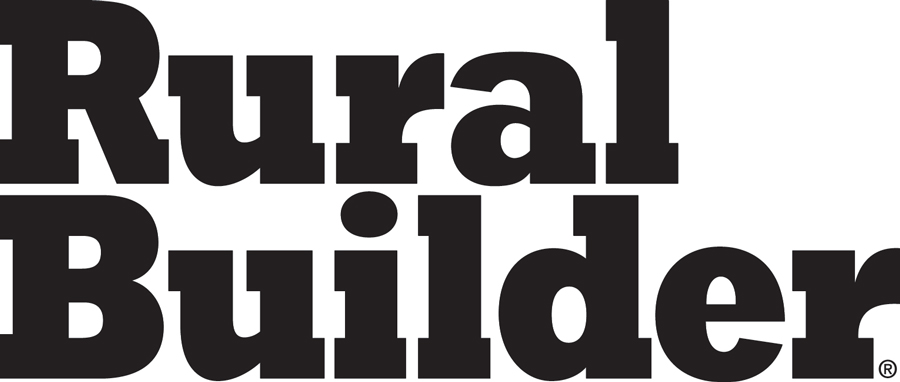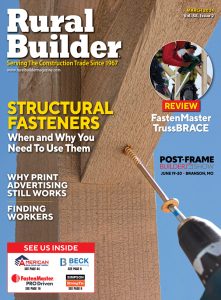by Mark Battersby

It is all too easy for builders and contractors to overlook their bank and how important it is to the success of their business. Although bank branches are disappearing in record numbers and there are a growing number of financing options, credit card processors and other services available from a variety of sources, every small business still needs a bank.
Despite how important banks are to small businesses, the majority of rural building businesses appear to be experiencing significant challenges when it comes to banking services. According to a survey of more than 1,000 business owners by BlueVine, a financial institution, and Researchscape, a marketing research firm, only 9% of small business owners say their current bank meets all of their needs. What’s more, a whopping 69% of small business owners feel their current bank doesn’t meet all of their needs and, thus, would be willing to switch banks.
A credit card processor may offer less expensive fees and the fast-growing web financing community might offer more attractive rates, but only banks allow a building business owner or manager to negotiate lower rates based on the number of services they utilize.
SERVICE WITH A SMILE — AND A PRICE
Choosing a bank involves more than simply opening a new account at the branch closest to the operation’s base. First, consider what services are required and how much they will cost.
Among the common, basic services a builder or contractor might need are services such as:
* Checking account
* Business savings account
* Credit/Debit card
* Deposit-only card
* Employee checking accounts
* Online banking
Lending Services:
* Lines of credit
* Term loans
* Commercial real estate
* Equipment leasing
* SBA loans
* Cash Management
* Wire transfers
* Wholesale lockbox
* Merchant services
Other:
* Payroll
* Retirement accounts
* Insurance
While many of these services are also available from other sources, banks may be more convenient — and the cost of those services may be less, depending upon the number of services or “products” used by the building operation. Since the fees for many of these services are often “bundled,” comparison shopping is a must. And don’t forget many of these fees are negotiable.
FEES, MORE OR LESS
Obviously, the amount of the fees charged and how they are incurred can differ widely from bank to bank. Even with a so-called “free” business banking account, there are often extra charges based on usage, special services or more. The business may, for example, be charged fees for:
* Failing to maintain a minimum balance
* Making too many deposits or withdrawals
* Not using the account frequently enough
That basic business checking account usually has a monthly service charge, but that charge is often waived if certain minimum balance thresholds are met each month. All-too-often, banks will limit the number of monthly transactions permitted before fees kick-in.
Today’s banking includes electronic funds transfer (EFT), automatic payments and unexpected expense protection. When considering a bank’s offerings, many experts advise trading up a service tier instead of attempting to limit transactions.
Unfortunately, small business market research has revealed there is vast room for improvement with the features and services offered by banks — and with their fee structure. Although many building businesses are paying expensive and confusing fees, they don’t always get the service or features that benefit them the most. According to that earlier survey, 7% of those surveyed say deposited checks don’t show up in their bank accounts fast enough, 6% say their bank doesn’t offer overdraft protection, and 5% claim poor customer service.
Has the time come to shop for a new bank?
SHOPPING FOR A BANK
When shopping for a bank, size matters. Obviously, there are both benefits and drawbacks to working with different banks, usually based on their size. Comparing small, medium, and large banks usually revolves around the type of bank:
* Credit Unions offer some of the most competitive loan rates, but only members can apply for those loans
* Community banks are often a good fit if the top priority is personalized service
* Regional banks serving an entire state or region are a better fit for medium-sized businesses — or small businesses with aggressive growth strategies
* Big banks are usually the answer if low fees and the latest online banking technology are important. They also usually offer the best incentives for attracting new business.
Banks want your business but while they’ll sometimes offer significant cash bonuses for opening a business account, remember, no matter how appealing that cash bonus might appear, it is the building operation’s day-to-day banking needs that count. In the long-term, meeting the needs of the business will have a bigger impact on the health of the business than any immediate cash benefit.
BORROWING 101
As mentioned, there may be cheaper financing options available, but bank financing has long been key to the success of many small businesses. Proper use of small business loans can consolidate debt, provide needed capital and allow for expansion.
Among the questions a potential banking partner should answer are:
What are your loan rates like? Rates charged by large financial institutions “are systematically lower” than those charged by community banks according to a study by the National Federation of Independent Business. Larger banks are also more likely to issue corporate credit cards to small businesses, which can be used for financing.
Does the banker have lending authority? What is the largest loan he or she can approve without seeking higher review? Community bankers often have more discretion than those at a branch of a bigger institution since they consider small-business lending their bread-and-butter.
How can a small business qualify for a loan? Most banks look for the “Five Cs” of credit — capacity, collateral, capital, character and conditions. A builder or contractor lacking in these areas might find it difficult to obtain a small business loan.
If the operation’s loan needs change, is the bank flexible? A business with expansion plans will want to find out up-front whether their bank will provide support with their loans and line-of-credit offerings.
What are the terms for a line of credit? Having funds approved but not disbursed provides a safety net should the unexpected occur.
Does the bank work with the U.S. Small Business Administration (SBA)? Federally subsidized loans protect a bank against default, which makes it easier for the bank to loan money. SBA loans are available to businesses with poor credit histories, cash flow or collateral might be inadequate for a traditional loan. The SBA usually offers more flexible repayment terms.
Does the bank offer online banking? Online banking is the core of financial operations for many businesses. With online banking, balances can be viewed along with recent activity. Transfers can be initiated to other accounts and, of course, bills can be paid online.
What “extras” does the bank offer? Despite stiffer lending procedures, larger banks may offer services that can save time and money. Tax and accounting assistance along with sending invoices, collecting payments, payroll processing, and loan application advice are more options.
Fortunately, banking is a competitive business and it rarely takes long for a new product or service to be copied by banks around the country. Trust and being comfortable with a bank are often more important than a seemingly new product or service.
WHAT DOES THE BUSINESS NEED?
Before comparing sign-up bonuses, perks, services and fees, it’s important to consider what the building operation needs. Banking relationships should be viewed as long-term, not what the business needs today but what it might require 18 to 24 months down the road.
Today, the distinction between “large” and “small” banks has blurred thanks to the industry’s consolidation. Many community banks have merged allowing them to offer a wider range of services. Today, banks of all sizes are emphasizing improved customer service having discovered that customers still like face-to-face or personal service at branches versus blindly conducting transactions online.
Smaller, regional banks may be better for many builders and contractors because they are familiar with local market conditions. They often provide more one-on-one access to a loan officer and put more emphasis on a borrower’s character rather than merely applying a credit-score model. And those smaller regional banks can be more flexible during rough times, often covering overdrawn accounts without imposing stiff penalties.
Finding a banker who understands the building business, its creditworthiness and seasonal borrowing needs is essential. Selling the banker on the operation’s growth potential and the opportunity it offers a bank for additional services, is important.
Once a banking relationship has been established, it is a good practice to meet personally if only to update the business’s finances. It is also a good idea to interview branch managers at competing banks every few years to gauge the willingness to work with the building business’s owner or manager. While switching banks can be a hassle, advising the operation’s current banker that you’re shopping around can be rewarding. RB




















